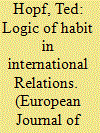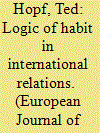|
|
|
Sort Order |
|
|
|
Items / Page
|
|
|
|
|
|
|
| Srl | Item |
| 1 |
ID:
161396


|
|
|
|
|
| Summary/Abstract |
Beyond the esoteric deliberations of Islamic jurists and their exegesis of criminal and private law doctrines, Iranian law lives a life of its own. It is a life of routine practices of judges, court clerks, lawyers and clients, each of whom is striving to turn the law to their own advantage. It is also a life of contested legality, a relentless struggle over the right to determine the law in a juridical field which is infused with strife and hostility. These conflicts are reproduced daily as two competing conceptions of law, and their corresponding perceptions of legality clash in pursuit of justice. The Iranian judiciary’s concept of law, its reconstruction of Islamic jurisprudence and methods of dispensing justice, which on the surface are reminiscent of Max Weber’s “qādi-justice,” collide with the legal profession’s formal rational understanding thereof. However, Iranian judges are not Weberian qādis, and the legal profession is not a homogenous group of attorneys driven by a collective commitment to the rule of law. To understand their conflict, we need to explore the mundane workings of the legal system in the context of the transformation of Iranian society and the unresolved disputes over the direction of its modernity.
|
|
|
|
|
|
|
|
|
|
|
|
|
|
|
|
| 2 |
ID:
101367


|
|
|
|
|
| Publication |
2010.
|
| Summary/Abstract |
IR theory is dominated by the logics of consequentialism and appropriateness. But Max Weber offered four logics of choice, not just two. Beyond the instrumental rationality of Zweckrationalität and the normative rationality of Wertrationalität are affect and habit. Drawing on Weber, James, Dewey, and Bourdieu, and habit's microfoundations in neurocognitive psychology, I explore the logic of habit and its consequences for several fundamental puzzles in IR theory. The logic of habit necessarily precludes rationality, agency, and uncertainty, and so offers a different interpretation of cooperation, security dilemmas, enduring rivalries, and security communities in international politics. The logic of habit also fills a gap in mainstream constructivism's theorization of intersubjective structures, returning the taken-for-granted lifeworld to the center of attention.
|
|
|
|
|
|
|
|
|
|
|
|
|
|
|
|
| 3 |
ID:
101374


|
|
|
|
|
| Publication |
2010.
|
| Summary/Abstract |
IR theory is dominated by the logics of consequentialism and appropriateness. But Max Weber offered four logics of choice, not just two. Beyond the instrumental rationality of Zweckrationalität and the normative rationality of Wertrationalität are affect and habit. Drawing on Weber, James, Dewey, and Bourdieu, and habit's microfoundations in neurocognitive psychology, I explore the logic of habit and its consequences for several fundamental puzzles in IR theory. The logic of habit necessarily precludes rationality, agency, and uncertainty, and so offers a different interpretation of cooperation, security dilemmas, enduring rivalries, and security communities in international politics. The logic of habit also fills a gap in mainstream constructivism's theorization of intersubjective structures, returning the taken-for-granted lifeworld to the center of attention.
|
|
|
|
|
|
|
|
|
|
|
|
|
|
|
|
| 4 |
ID:
178478


|
|
|
|
|
| Summary/Abstract |
Iranians’ struggle for democracy has dominated the contemporary history of the country for the last century. These attempts have often resulted in the emergence of authoritarian regimes rather than institutionalizing democracy in the body of the state. Scholars and politicians often consider the process of institutionalism of democracy in Iran to be a top-down approach toward political reform. The literature on the topic either focuses on economics and its associated politics or industrialization and legal reform as keys to success but often ignores the social foundations of institutionalism of democracy and, in the process, undermines their roles. Transition to democracy in Iran requires a social context based on Habermas’ “Tripartite of Knowledge,” and these conditions democratize the construction of a social system that prioritizes rational inquiry, socio-moral knowledge, and sociopolitical knowledge, and the need is to form a democratic society in line with the realization of political democratization.
|
|
|
|
|
|
|
|
|
|
|
|
|
|
|
|
|
|
|
|
|